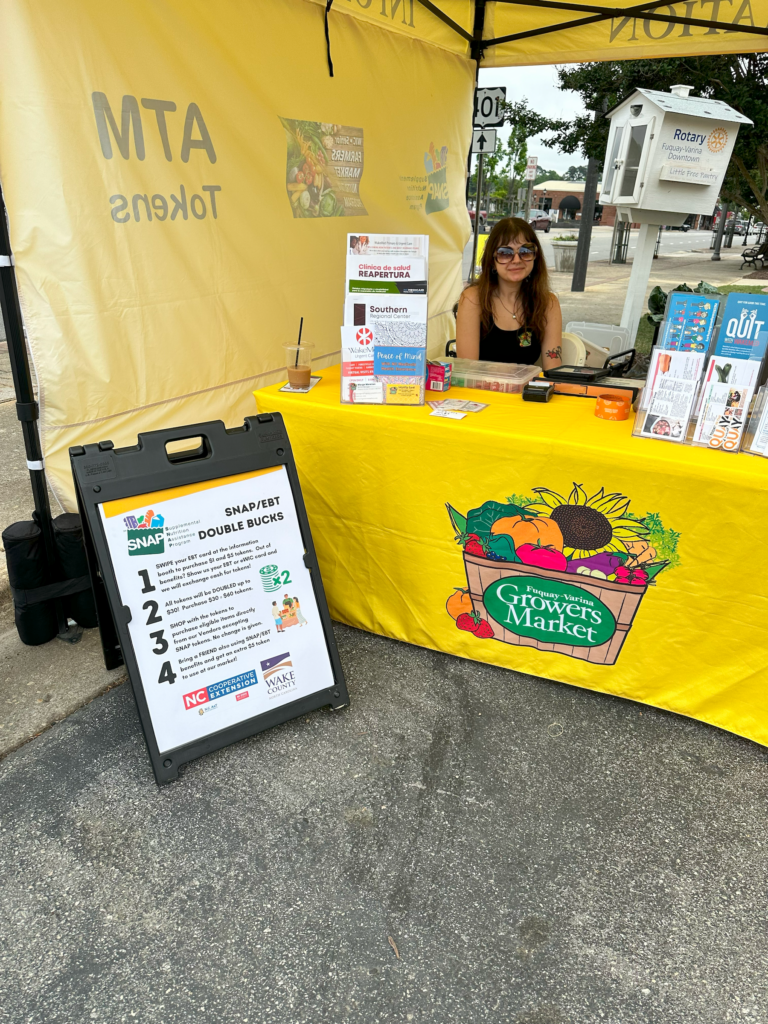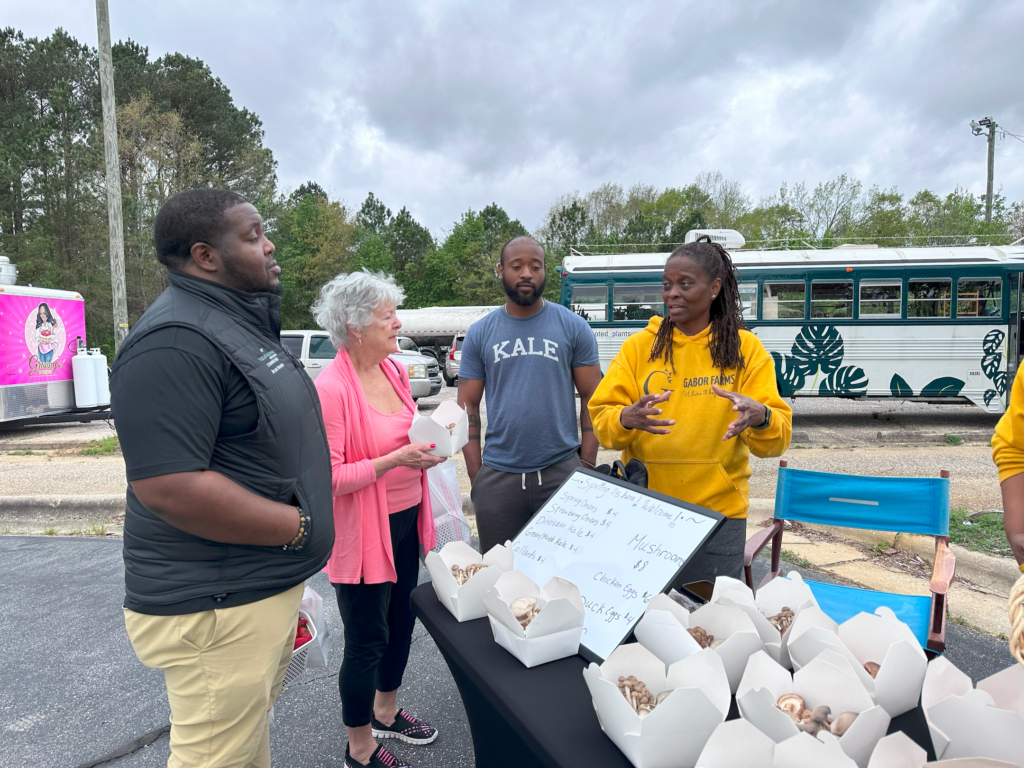Moving Beyond Hunger: A Conversation With Trevor Hyde
go.ncsu.edu/readext?1017947
en Español / em Português
El inglés es el idioma de control de esta página. En la medida en que haya algún conflicto entre la traducción al inglés y la traducción, el inglés prevalece.
Al hacer clic en el enlace de traducción se activa un servicio de traducción gratuito para convertir la página al español. Al igual que con cualquier traducción por Internet, la conversión no es sensible al contexto y puede que no traduzca el texto en su significado original. NC State Extension no garantiza la exactitud del texto traducido. Por favor, tenga en cuenta que algunas aplicaciones y/o servicios pueden no funcionar como se espera cuando se traducen.
Português
Inglês é o idioma de controle desta página. Na medida que haja algum conflito entre o texto original em Inglês e a tradução, o Inglês prevalece.
Ao clicar no link de tradução, um serviço gratuito de tradução será ativado para converter a página para o Português. Como em qualquer tradução pela internet, a conversão não é sensivel ao contexto e pode não ocorrer a tradução para o significado orginal. O serviço de Extensão da Carolina do Norte (NC State Extension) não garante a exatidão do texto traduzido. Por favor, observe que algumas funções ou serviços podem não funcionar como esperado após a tradução.
English
English is the controlling language of this page. To the extent there is any conflict between the English text and the translation, English controls.
Clicking on the translation link activates a free translation service to convert the page to Spanish. As with any Internet translation, the conversion is not context-sensitive and may not translate the text to its original meaning. NC State Extension does not guarantee the accuracy of the translated text. Please note that some applications and/or services may not function as expected when translated.
Collapse ▲“ Rooted in Resilience” – Wake County Cooperative Extension “works to improve the lives, land and economy of all people in Wake County”. In an effort to transition from food relief to food resilience, the 2023 Wake County Food Security Plan secured $7.2 million from the American Rescue Plan Act funds to support food security strategies and projects within the county. Wake County Cooperative Extension is leveraging these funds to implement county and regional policy, systems, and environmental change. We sat down with Trevor Hyde, Wake County Local Food Systems and Family and Consumer Sciences Agent, to learn more about the projects and efforts that have been or will be a part of this county-wide strategic food security plan, as well as other goals he has for the regional local food landscape.
Rooted in Resilience” – Wake County Cooperative Extension “works to improve the lives, land and economy of all people in Wake County”. In an effort to transition from food relief to food resilience, the 2023 Wake County Food Security Plan secured $7.2 million from the American Rescue Plan Act funds to support food security strategies and projects within the county. Wake County Cooperative Extension is leveraging these funds to implement county and regional policy, systems, and environmental change. We sat down with Trevor Hyde, Wake County Local Food Systems and Family and Consumer Sciences Agent, to learn more about the projects and efforts that have been or will be a part of this county-wide strategic food security plan, as well as other goals he has for the regional local food landscape.
Food Hub Aggregation Support | A Food Hub Feasibility Study completed in the county found the primary needs of food hubs to be cold storage, vehicles, and trained staff, so $1,248,000 was provided to four local food hubs to help expand local food procurement capacity. The food hubs that received the funding included Farmer Foodshare, Firsthand Foods, Working Landscapes, and Black Farmers Hub. In an effort to help connect the food hubs with institutional partners, the Capital Area Food Network (Wake County’s Food Policy Council) has started a Food Procurement Circle of Practice that meets monthly. Two of the current connections for getting more local food into local institutions are Duke Dining and Wake County Public School System!
Support Local & Build Markets | The Food Bank of Central and Eastern NC and the Interfaith Food Shuttle received $1,485,000 of funding to increase local food procurement for local emergency food relief efforts with an emphasis on paying farmers a fair wholesale rate for their product. “We hope this project, which has a long-term investment plan for these two organizations, will build local wholesale markets for farmers and food aggregators in the Central Region of NC,” Trevor shared.
Food Justice Cohort | The Community Food Systems Team of Wake County Cooperative Extension, Wake County Office of Diversity, Equity, and Inclusion, and Capital Area Food Network members used a “snowball method” to help assemble the Wake County Food Justice Cohort – a paid cohort of food systems experts with lived experience of food insecurity in their lives and in their communities.
The Food Justice Cohort reviewed projects and worked to shape the funding processes, increase accessibility, and evaluate proposals using a more equitable criteria for community gardens and food pantry innovations. Ten gardens in Wake County received $63,800 to increase their ability to grow more fresh, local produce, as well as create more gathering space in areas with fewer green spaces. The harvest from these gardens is shared with members of the community most in need, or with a local food pantry. Nineteen food pantries in Wake County received $215,584 to fund efforts such as increasing the number of vehicles for food pickups, extending hours of operation for pantry clients, and expanding cold storage, which received the most ($101k!) as it will improve the quality of food received and allow for better storage of fresh products.

Additional proposed efforts of the cohort focus on community health workers, mobile market expansion, and a produce prescription program. Positions at local community-based organizations will be funded ($700,000 available) with a goal to build trust in immigrant and refugee communities by helping navigate institutional processes, connect to resources and benefit programs, and to advocate for community needs. Additional vehicles will be funded ($692,000 available) for two food banks and additional partners to host more mobile markets at community sites that don’t currently operate a pantry, but with a high population of food insecure individuals. Lastly, 1,000 households will receive boxes of fresh, local produce for a family of four, for up to 24 months ($1.3 million available) as part of a produce prescription program. At least 80% of the produce in each box will be sourced from North Carolina farms, with an emphasis on historically underserved farmers. Recommendations for households to be served will come from local clinics and will include under- and uninsured patients suffering from comorbidity issues.
Smart Start Pilot | The Black Farmers Hub received $50,000 to host neighborhood farmers markets weekly alternating between two locations from July 2024-Fall 2025. The funds will go towards vouchers worth $200 that local Family Child Care Homes partnering with Wake County Smart Start and two childcare centers will be able to use each month at the neighborhood farmers markets to increase fresh, local produce offerings in their childcare centers and programs.
Farmers Markets |  Wake County farmers markets will receive over $180,000 by the end of 2026 to increase SNAP/EBT offerings. This includes providing Double Bucks match funding, purchasing equipment and tokens, connecting market managers to relevant training, and promoting that SNAP/EBT is accepted at these markets. Eight markets in the county are currently doing this work and receiving funding. The markets also offer the Produce 2 Pantries Program which uses funds to purchase produce from market vendors and donate it to local food pantries. From July 2023-December 2023, local pantries received over 7,500 pounds of produce from the Produce 2 Pantries Program.
Wake County farmers markets will receive over $180,000 by the end of 2026 to increase SNAP/EBT offerings. This includes providing Double Bucks match funding, purchasing equipment and tokens, connecting market managers to relevant training, and promoting that SNAP/EBT is accepted at these markets. Eight markets in the county are currently doing this work and receiving funding. The markets also offer the Produce 2 Pantries Program which uses funds to purchase produce from market vendors and donate it to local food pantries. From July 2023-December 2023, local pantries received over 7,500 pounds of produce from the Produce 2 Pantries Program.
Regional Efforts |  Trevor shared that many of the projects and efforts within the Food Security Plan will have impacts in counties nearby so he is working on creating Local Food Agent Regional Meetings to better coordinate efforts across his region. The Wake County Team has already partnered with neighboring counties on a couple of grant proposals including a Resilient Food Systems Infrastructure (RFSI) Grant with Johnston County, a Beginning Farmer and Rancher Development Program (BFRDP) Grant with area food hubs, and a Regional Food System Partnerships (RSFP) Grant with Durham County. These grant proposals aim to (1) create a new value-added processing center, (2) create on-farm coaching positions for wholesale farmers, and (3) create a community of practice of BIPOC growers in Central NC and fund Value Chain Coordinators at Regional Food Hubs, respectively.
Trevor shared that many of the projects and efforts within the Food Security Plan will have impacts in counties nearby so he is working on creating Local Food Agent Regional Meetings to better coordinate efforts across his region. The Wake County Team has already partnered with neighboring counties on a couple of grant proposals including a Resilient Food Systems Infrastructure (RFSI) Grant with Johnston County, a Beginning Farmer and Rancher Development Program (BFRDP) Grant with area food hubs, and a Regional Food System Partnerships (RSFP) Grant with Durham County. These grant proposals aim to (1) create a new value-added processing center, (2) create on-farm coaching positions for wholesale farmers, and (3) create a community of practice of BIPOC growers in Central NC and fund Value Chain Coordinators at Regional Food Hubs, respectively.


